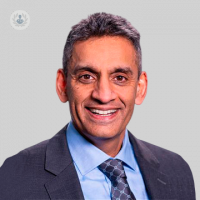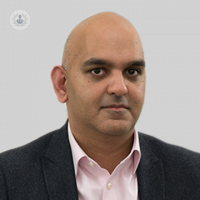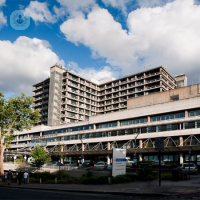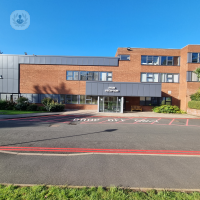What are palpitations?
Palpitations are heartbeats that become noticeable all of a sudden, either during activity or rest. People who experience palpitations may be alarmed but most of the time, they're completely safe.

What do palpitations feel like?
Palpitations are heartbeats that feel either too fast or too hard and sometimes they can feel like your heart is skipping a beat. These are felt in your chest, throat, or neck. The sensation can last for seconds or minutes.
What causes palpitations?
Palpitations can result from anxiety, stress, or panic attacks; caffeine intake or nicotine; consumption of illegal drugs; exercise, and fever.
Pregnancy and menopause can also cause heart palpitations.
Medication, including asthma inhalers, antihistamines, antibiotics, and antidepressants, can also cause them. Seek advice from your GP if you are experiencing palpitations caused by medication.
Heavy meals, particularly those rich in fat, sodium, and/or sugar, can cause palpitations. Palpitations can be a sign of food sensitivity if they always happen after eating a certain type of food.
Sometimes, heart palpitations can indicate more serious heart conditions, particularly if they happen frequently.
What conditions are palpitations a symptom of?
Palpitations can be a sign of a serious health condition, for example:
- Arrhythmias;
- Coronary artery disease;
- Heart failure;
- Heart valve problems;
- Heart muscle problems;
Other medical conditions like thyroid disease, anaemia, or low blood pressure can also result in palpitations.
Are palpitations serious?
Often palpitations are harmless, but if they occur frequently, a medical examination will be needed to rule out underlying heart problems, such as arrhythmia.
If you have a history of heart issues and are experiencing palpitations, you should book a consultation with your GP.
Only if palpitations are experienced in conjunction with breathlessness, dizziness, chest pains and fainting are they considered to require immediate medical attention.
Can palpitations be prevented?
It is possible to prevent palpitations by doing the following:
- Regular, moderate exercise
- Avoid anxiety and stress
- Treat underlying diseases
- Avoid tobacco, alcohol and coffee
How are palpitations diagnosed?
Doctors will start by taking a detailed medical history, for this reason, it is important to keep track of your palpitations. Doctors will then establish if there is a family history of heart issues, and perform a physical exam. To rule out possible underlying heart conditions, you may need to undergo further tests like an ECG, a blood pressure test, a stress test, a chest x-ray, or an echocardiogram.

How are palpitations treated?
Treatment will depend on the underlying cause of the palpitations. If it is caused by anxiety or stress, then these can be managed better. If they are caused by a stimulant, then these can be avoided. If there is an underlying heart condition, then this will have to be treated accordingly.
What specialist treats heart palpitations?
Cardiologists would diagnose and treat heart palpitations.
11-13-2012 04-25-2023Palpitations
Dr Alessandro Giardini - Paediatric cardiology
Created on: 11-13-2012
Updated on: 04-25-2023
Edited by: Lauren Dempsey
What are palpitations?
Palpitations are heartbeats that become noticeable all of a sudden, either during activity or rest. People who experience palpitations may be alarmed but most of the time, they're completely safe.

What do palpitations feel like?
Palpitations are heartbeats that feel either too fast or too hard and sometimes they can feel like your heart is skipping a beat. These are felt in your chest, throat, or neck. The sensation can last for seconds or minutes.
What causes palpitations?
Palpitations can result from anxiety, stress, or panic attacks; caffeine intake or nicotine; consumption of illegal drugs; exercise, and fever.
Pregnancy and menopause can also cause heart palpitations.
Medication, including asthma inhalers, antihistamines, antibiotics, and antidepressants, can also cause them. Seek advice from your GP if you are experiencing palpitations caused by medication.
Heavy meals, particularly those rich in fat, sodium, and/or sugar, can cause palpitations. Palpitations can be a sign of food sensitivity if they always happen after eating a certain type of food.
Sometimes, heart palpitations can indicate more serious heart conditions, particularly if they happen frequently.
What conditions are palpitations a symptom of?
Palpitations can be a sign of a serious health condition, for example:
- Arrhythmias;
- Coronary artery disease;
- Heart failure;
- Heart valve problems;
- Heart muscle problems;
Other medical conditions like thyroid disease, anaemia, or low blood pressure can also result in palpitations.
Are palpitations serious?
Often palpitations are harmless, but if they occur frequently, a medical examination will be needed to rule out underlying heart problems, such as arrhythmia.
If you have a history of heart issues and are experiencing palpitations, you should book a consultation with your GP.
Only if palpitations are experienced in conjunction with breathlessness, dizziness, chest pains and fainting are they considered to require immediate medical attention.
Can palpitations be prevented?
It is possible to prevent palpitations by doing the following:
- Regular, moderate exercise
- Avoid anxiety and stress
- Treat underlying diseases
- Avoid tobacco, alcohol and coffee
How are palpitations diagnosed?
Doctors will start by taking a detailed medical history, for this reason, it is important to keep track of your palpitations. Doctors will then establish if there is a family history of heart issues, and perform a physical exam. To rule out possible underlying heart conditions, you may need to undergo further tests like an ECG, a blood pressure test, a stress test, a chest x-ray, or an echocardiogram.

How are palpitations treated?
Treatment will depend on the underlying cause of the palpitations. If it is caused by anxiety or stress, then these can be managed better. If they are caused by a stimulant, then these can be avoided. If there is an underlying heart condition, then this will have to be treated accordingly.
What specialist treats heart palpitations?
Cardiologists would diagnose and treat heart palpitations.


What are palpitations?
By Dr Allan Harkness
2025-02-05
Undoubtedly, some people may feel worried or paranoid if they start to notice their heart palpitations. Leading cardiologist Dr Allan Harkness explains how most concerns of palpitations can be psychological, but also addresses what could be the possible causes of any irregularities... See more


What are the red flags for heart palpitations?
By Dr Aftab Gill
2025-02-05
Heart palpitations are sensations where the heart feels like it's pounding, fluttering or beating irregularly. While they’re often harmless, certain red flags may indicate a more serious underlying condition that requires medical attention. See more


Support atrial fibrillation treatment with lifestyle habits
By Dr Saagar Mahida
2025-02-05
Atrial fibrillation is a heart rhythm abnormality that is treated with curative procedures and medications. However, your lifestyle choices have the power to influence your treatment success. Learn how to support your atrial fibrillation treatment with lifestyle habits, as explained by a leading UK cardiologist and electrophysiologist, Dr Saagar Mahida. See more
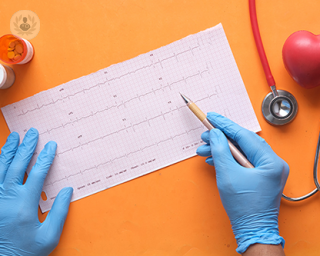

What are palpitations and when should you be concerned?
By Dr Ahmed Elghamaz
2025-02-05
Palpitations are sensations in which you feel your heart beating too quickly, too strongly, or irregularly. It’s a common experience that many people describe as feeling like their heart is “fluttering,” “pounding,” or even “skipping a beat.” Though they can feel alarming, palpitations are often harmless. However, they can sometimes be a sign of an underlying health condition, which is why it’s important to understand their causes and know when to seek medical advice. We speak to leading cardiologist Dr Ahmed Elghamaz, who explains more. We speak to a leading cardiologist, who explains more. See more
Experts in Palpitations
-
Dr Michael John Van der Watt
CardiologyExpert in:
- Heart murmur
- Angina
- Syncope
- Palpitations
- Heart failure
- Pacemaker
-
Dr Rajan Sharma
CardiologyExpert in:
- Echocardiogram
- Coronary heart disease
- Valvular heart disease
- Heart failure
- Hypertension (high blood pressure)
- Palpitations
-
Dr Sayan Sen
CardiologyExpert in:
- Chest pain
- Pacemaker
- TAVI (transcatheter aortic valve implantation)
- Coronary angioplasty
- Palpitations
- Hypertension (high blood pressure)
-
Dr Andrew Deaner
CardiologyExpert in:
- Cardiovascular disease
- Coronary angioplasty
- Echocardiogram
- Pacemaker
- Palpitations
- Heart failure
-
Dr Syed Ahsan
CardiologyExpert in:
- Arrhythmia
- Cardiac (catheter) ablation
- Atrial Fibrillation
- Chest pain
- Pacemaker
- Palpitations
- See all

The Royal Free Hospital
The Royal Free Hospital
Pond Street, Hampstead. NW3 2QG
No existe teléfono en el centro.
By using the telephone number provided by TOP DOCTORS, you automatically agree to let us use your phone number for statistical and commercial purposes. For further information, read our Privacy Policy
Top Doctors

Cleveland Clinic London Hospital
Cleveland Clinic London Hospital
33 Grosvenor Place, SW1X 7HY
No existe teléfono en el centro.
By using the telephone number provided by TOP DOCTORS, you automatically agree to let us use your phone number for statistical and commercial purposes. For further information, read our Privacy Policy
Top Doctors

The Priory Hospital - part of Circle Health Group
The Priory Hospital - part of Circle Health Group
Priory Road, Edgbaston, Birmingham B5 7UG
No existe teléfono en el centro.
By using the telephone number provided by TOP DOCTORS, you automatically agree to let us use your phone number for statistical and commercial purposes. For further information, read our Privacy Policy
Top Doctors
-
The Royal Free Hospital
Pond Street, Hampstead. NW3 2QG, Central LondonExpert in:
- General Surgery
- Orthopaedic surgery
- Robotic Surgery
- Dermatology
- Obstetrics and Gynaecology
- Paediatrics
-
Cleveland Clinic London Hospital
33 Grosvenor Place, SW1X 7HY, Central LondonExpert in:
- Cardiology
- Colorectal surgery
- Minimal access surgery (keyhole surgery)
- Gallbladder surgery
- Diagnostic Imaging
- Ultrasound
-
The Priory Hospital - part of Circle Health Group
Priory Road, Edgbaston, Birmingham B5 7UG, EdgbastonExpert in:
- Cancer
- General Surgery
- Orthopaedic surgery
- Thoracic Surgery
- Obstetrics and Gynaecology
- Urology
- See all
- Most viewed diseases, medical tests, and treatments
- Cardiovascular disease
- Cardiac screening
- Respiratory infection
- Osteoporosis
- Narcolepsy
- Snoring
- Polysomnography (sleep study)
- Alzheimer's disease
- Chronic headache
- Electrophysiology study


